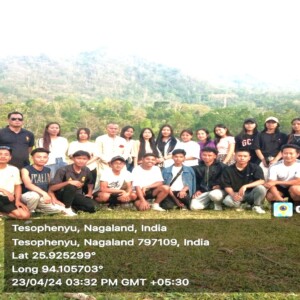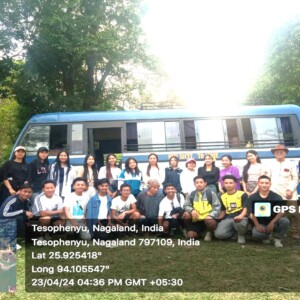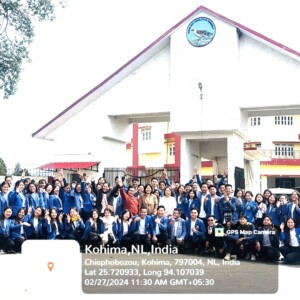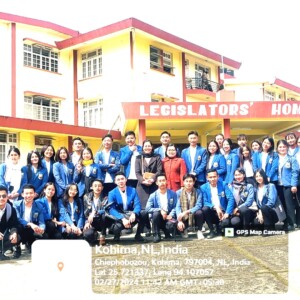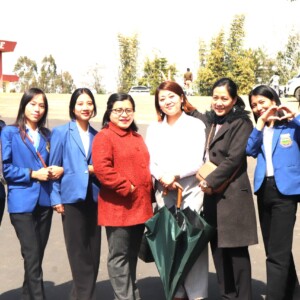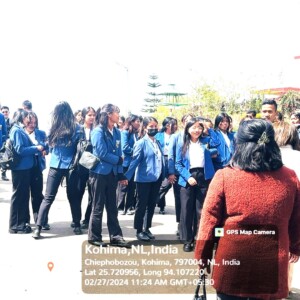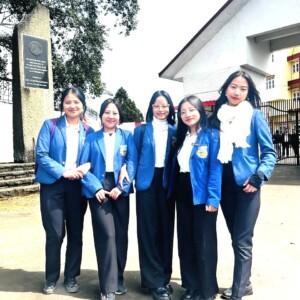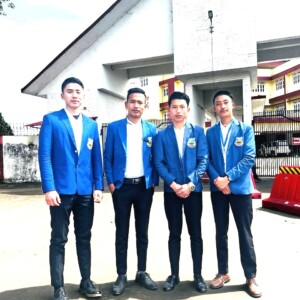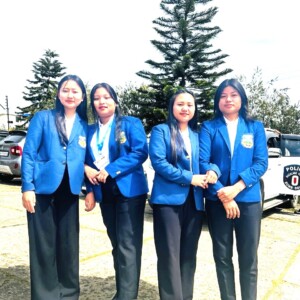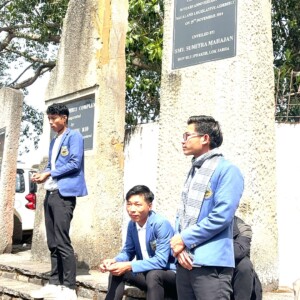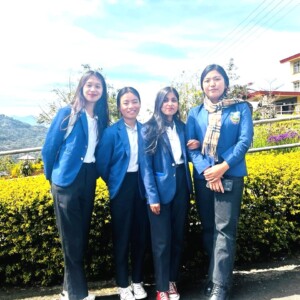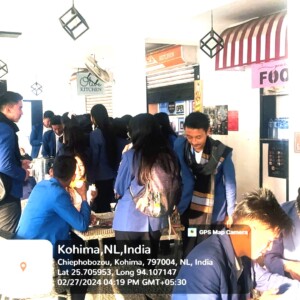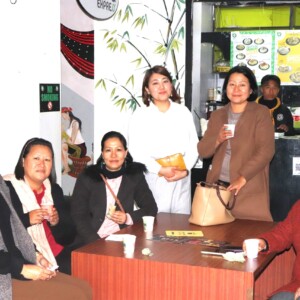23rd April, 2024: Educational outing to Nsonji Lake, New Sendenyu Biodiversity Conservation Area
An educational outing to Nsonji Lake, New Sendenyu was organised on 23rd April, 2024 for the 6th Semester Education Honours students. The Faculties of Education Department and the students had a breathtaking and an incredible experience through the alluring touch with the nature adding more understanding towards the need of knowledge acquired through outside of the classroom.
This lake is a biodiversity conservation area and protected under Article 371A of Indian Constitution with special provision for the state of Nagaland & The Sendenyu Village Council Wildlife Conservation Act 2001.
The wildlife reserve in Sendenyu village, about 1 km down the hill, was formed as a result of discussions initiated in the village council (VC) by some village members who had studied outside the state and are currently serving as government officials. These members were good hunters themselves, but decreasing wildlife populations became a grave concern for them. The village elders immediately understood their concern, as they had witnessed a very sudden decrease in wildlife populations within their lifetimes. The discussions, therefore, soon resulted in the creation of about 22 sq km of the wildlife reserve. The objective was to conserve and protect the rich wildlife heritage of the village and to maintain an ecological balance as also to check the local extinction of wild animals.
In the year 2001, the leaders and members of Sendenyu village(s) resolved to start community conservation – ‘Sendenyu Community Biodiversity and Wildlife Reserve’, as a response to a rapid decline of fauna and flora species in the region. It constituted a committee called Sendenyu Community Biodiversity and Wildlife Conservation Committee to ensure proper management of the conserved area.
The total conserved area is 2200 hectares (22 sq km). The conservation efforts have received notable recognition for their pioneering work on community conservation and contribution to the community conservation movement in the region and Nagaland. Furthermore in 2018, during the Centenary celebration of the advent of 100 years of Christianity in the village, the community decided to make the lake below the community conserved area into Jubilee Memorial Park which is managed by Nsonji Management Committee. As a result of the biodiversity conservation efforts and Nsonji lake restoration the scope for rural nature-based tourism potential in the village area grew. Likewise, the North East Council (NEC) Tourism Board approved a proposal to establish an ecotourism destination centre in the village. The construction work will begin in 2018 and will be completed by 2022. The centre is built on community land governed by the Sendenyu Chwipen Union, the apex citizen membership union of Sendenyu village(s).
27th February, 2024: Department of Political Science organised its annual visit to the Nagaland Legislative Assembly for the 6th Semester Honours students during the budget session
Learning Outcome submitted by Kikhosou Rume 6th semester, Political Science Honours
The invaluable insights gleaned from my visit to the 14th session of the Nagaland Legislative Assembly on the auspicious day of February 27th, 2024, resonate deeply within me. As I reflect upon the experience, I learned profound lessons encapsulating the essence of democratic governance and civic engagement. The following points encapsulate the essence of my enlightening encounter:
- Understanding Legislative Process: Witnessing the proceedings of the Legislative Assembly provided a firsthand understanding of how laws are proposed, debated, and enacted. The session highlighted the importance of legislative committees, question hour, and debates in shaping public policy.
- Governance Dynamics: Observing the interactions between elected officials, and stakeholders shed light on the complexities of governance. Understanding the roles and responsibilities of different actors within the legislative framework deepened our appreciation for the challenges and opportunities in governing a diverse state like Nagaland.
- Roles of Elected Representatives: The visit highlighted the roles and responsibilities of elected representatives in representing their constituencies. Observing legislators articulate the concerns of their constituents and engage in debates underscored the importance of effective representation in the democratic process.
- Political Discourse: The session showcased the diversity of political opinions and ideologies within the Assembly. Observing the debates and discussions on various topics and issues underscored the importance of respectful dialogue and compromise in democratic decision-making.
- Public Policy: The agenda of the session included discussions on critical issues facing Nagaland, such as infrastructure development, Free Movement Regime ( FMR ) and border fencing announced by the Central Government, advance GST collection and the identification of economically backward villages, concerns regarding agriculture productivity and drug control measures. Witnessing these deliberations provided valuable insights into the priorities of the state government and the challenges in addressing complex societal issues.
- Understanding Civic Engagement: Attending the Legislative Assembly session encouraged civic engagement by allowing us to witness democracy in action. By observing the proceedings and engaging with elected representatives, we gained a deeper appreciation for the importance of active citizenship and participation in the democratic process.
- Debating Skills and Civic Discourse: The session showcased various debating skills and styles employed by legislators during discussions on different legislative matters. It emphasized the significance of civil discourse, respectful disagreement, and the exchange of ideas in shaping public policy.
- Understanding Current Issues: Being present at the Legislative Assembly session provided valuable insights into the pressing issues facing Nagaland . Discussions on topics such as infrastructure development, education, healthcare, and regional development shed light on the priorities and challenges confronting the state.
- Democratic Participation and Civic Engagement: Participation in the Legislative Assembly session underscored the importance of civic engagement in the democratic process. It highlighted the role of citizens in holding elected officials accountable and advocating for policies that address community needs
- Legislative Decorum: The visit allowed us to observe the decorum and procedures followed within the Assembly. This included understanding the roles and responsibilities of the Speaker, the protocols for raising questions and concerns, and the manner in which debates are conducted.
It enhanced our understanding of democracy and the role of elected representatives in shaping the future of Nagaland. This experience has instilled a greater appreciation for the complexity of governance and the importance of citizen engagement in the democratic process. We are grateful for the opportunity and look forward to applying our learnings to contribute positively to our community and society.

